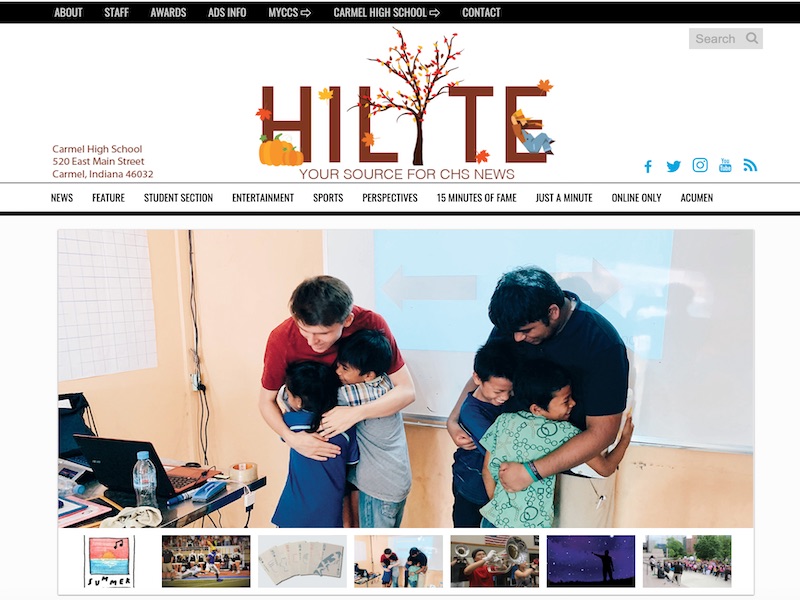The 5-Second Trick For News Websites
The 5-Second Trick For News Websites
Blog Article
10 Easy Facts About News Websites Described
Table of ContentsThe Of News WebsitesNews Websites Can Be Fun For AnyoneA Biased View of News WebsitesGetting The News Websites To WorkSee This Report on News Websites
It was down in the UK and Brazil however up a few other countries, such as Greece, Bulgaria, and Poland (News Websites). This year, for the very first time, we asked about the different manner ins which people stay clear of the news and located that around half of avoiders (53%) were attempting to do so in a broad-brush or periodic method as an example, by transforming off the radio when the news came on, or by scrolling past the information in social media sitese.g. scrolling previous information, transforming networks when news begins. of avoiders check resources much less typically. e.g. limitation to certain times of day, switching off notices, etc. of avoiders stay clear of some topics. e.g. topics that lower mood or rise stress and anxiety. You stated that you attempt to proactively avoid information.

I'm most likely selecting to review more light-hearted stories than I utilized to presently. M, 51, UK Turning my back on information is the only way I feel I can deal occasionally. I have to knowingly make the initiative to avert for the benefit of my very own psychological health.
Not known Factual Statements About News Websites
Selective evasion of Ukraine information was highest in a number of the countries closest to the dispute, enhancing findings from our added study last year, not long after the war had actually started. Our information may not recommend a lack of rate of interest in Ukraine from close-by nations yet rather a need to handle time or secure mental health from the really genuine scaries of battle.
Comparing Finland with a politically polarised nation such as the USA (see following graph) that is much less influenced by the war, we find a really different pattern of subject avoidance. In the USA, we locate that customers are extra likely to prevent subjects such as national politics and social justice, where discussions over issues such as sex, sexuality, and race have come to be extremely politicised.
American politics are quite poisonous nowadays. I find sometimes that I have to separate from tales that simply make me upset. F, 61, United helpful resources States For some individuals, bitter and divisive political arguments are a reason to turn off news completely, but also for some political upholders, evasion is frequently regarding shutting out point of views you don't wish to hear.

More About News Websites
Some are seeking to make news much more available for hard-to-reach teams, widening the news schedule, appointing even more motivating or positive information, or accepting constructive or services journalism that offer individuals a sense of hope or personal agency. In our study this year, we asked participants concerning their rate of interest in these various methods.
This explains why tales like Ukraine or nationwide politics execute well with information regulars however can at the very same time transform much less interested customers away (News Websites). Selective avoiders are much less interested in all kinds of information than non-avoiders however in family member terms they do appear to be more thinking about favorable or solutions-based news

The Ultimate Guide To News Websites
2023). This may be true in the moment, but over time it seems to be leaving numerous individuals vacant and much less satisfied, which might be undermining our link with and rely on the news. Across markets, overall count on information (40%) and rely on the resources people utilize themselves (46%) are down by a further 2 portion factors this year.
Certainly, through the rear-view mirror, the COVID-19 trust fund bump is plainly noticeable in the following graph, though the instructions of travel later on has actually been blended. In some situations (e.g. Finland), the trust fund boost has been maintained, while in others the upturn looks more like a blip in a tale of ongoing long-lasting decrease.
Some of the highest possible reported levels of media objection are located in nations with highest degree of distrust, such as Greece, the Philippines, the United States, Check Out Your URL France, and the UK. The most affordable levels of media objection frequent those with greater levels of trust fund, such as Finland, Norway, Denmark, and Japan.
7 Easy Facts About News Websites Described
This year we asked respondents about their choices for message, audio and video clip when eating news online. Typically, we locate that the majority still like to read the information (57%), rather than watch (30%) or listen to it (13%), however more youthful individuals (under-35s) are more most likely to pay attention (17%) than older groups.
Behind the averages we discover substantial and unexpected nation distinctions. In markets with a solid reading practice, such as Finland and the United Kingdom, around 8 in ten still favor to review online information, yet in India and Thailand, around four in ten (40%) say they like to see information online, and in the Philippines that percentage is over half (52%).
Report this page